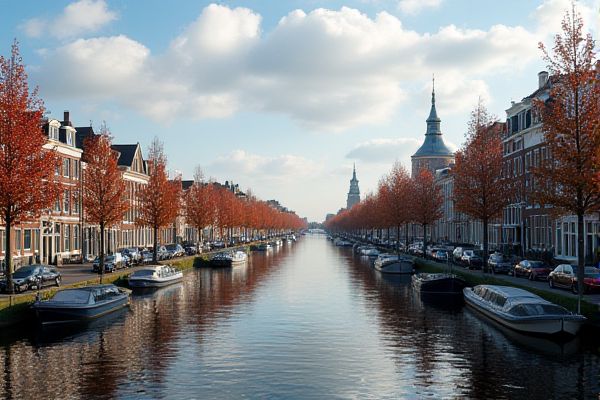
Shopping and retail options in Netherlands: VAT-inclusive pricing system. Popular online shopping platforms: Bol.com, Coolblue. Weekly open-air markets. Supermarkets: Albert Heijn, Lidl, Jumbo. Dutch specialty shops: cheese, stroopwafels. Common payment: PIN, contactless cards. Limited Sunday shopping hours. Seasonal sales events. Eco-friendly shopping initiatives. Specialty app-based grocery services.
VAT-inclusive pricing system.
In the Netherlands, retail prices are mandated to be displayed including VAT. For B2C transactions, it is essential that the prices, VAT amount, and total amount to be paid are clearly displayed before the customer validates the order. This requirement ensures transparency and compliance, preventing any confusion or discrepancies during the purchasing process. For further information on applying VAT correctly on an e-commerce site or marketplace in Europe, you can visit the insightful article on Clever Age.
Popular online shopping platforms: Bol.com, Coolblue.
Bol.com is the leading online shopping platform in the Netherlands, akin to Amazon, offering a vast range of products with quick delivery times and a partnership with Albert Heijn for convenient delivery and returns. Coolblue is a prominent online retailer specializing in consumer electronics, known for its excellent customer service, fast delivery, and a strong omnichannel presence with both online and physical stores in the Netherlands, Belgium, and Germany. For more detailed insights on the top online shopping sites in the Netherlands, you can visit the comprehensive guide on Best Online Shopping Netherlands Sites.
Weekly open-air markets.
The Netherlands, particularly Amsterdam, is home to numerous weekly open-air markets, including the Albert Cuyp Market, Dappermarkt, Nieuwmarkt, Noordermarkt Flea Market, Waterlooplein Flea Market, and Westerstraat Market. These markets offer a wide range of products such as fresh produce, clothing, antiques, and second-hand items, each with its unique atmosphere and shopping experience. To explore more about these vibrant spaces, visit the comprehensive guide on Amsterdam's Open-Air Markets, where you can delve into the diverse offerings that enrich the local culture and community.
Supermarkets: Albert Heijn, Lidl, Jumbo.
In the Netherlands, key supermarket chains include Albert Heijn, the largest with nearly 1,000 stores focusing on quality products; Lidl, a German discount retailer offering low-priced essentials and non-food items; and Jumbo, a competitor to Albert Heijn known for being slightly more budget-friendly with a decent selection of fresh and dried goods. For more detailed information, you can explore the offerings of these supermarkets on the Expatica website, which provides a comprehensive guide to Dutch supermarkets and grocery shopping.
Dutch specialty shops: cheese, stroopwafels.
In the Netherlands, specialty shops abound, particularly for cheese and stroopwafels. For cheese, local shops away from tourist areas offer the best selection, while for stroopwafels, popular spots include Van Wonderen, Rudi's, and Nicolaas Waffles, each known for their traditional and authentic offerings. To explore more about Dutch grocery shopping and supermarkets, visit this comprehensive guide on Expatica, where you can learn more about local specialties and where to find them.
Common payment: PIN, contactless cards.
In the Netherlands, common payment methods include PIN cards (debit cards) and contactless cards. PIN cards can be used for both chip and PIN transactions and contactless payments for amounts up to EUR25 without entering a PIN, while larger amounts require PIN entry for security. For more detailed information on how to effectively use your PIN card while settling in, refer to the guidance on the Access NL website, which offers comprehensive insights into the banking system in the region.
Limited Sunday shopping hours.
In the Netherlands, Sunday shopping hours are limited, with most shops in major cities like Amsterdam, The Hague, and Utrecht open on Sundays from 12 pm to 5 or 7 pm, while smaller cities may only have Sunday shopping on the first Sunday of each month. Municipalities have the authority to decide on Sunday opening hours, and some shops like supermarkets and those in tourist areas may have more flexible hours. For more details on this, you can visit the guide on Opening Hours and Public Holidays in the Netherlands.
Seasonal sales events.
In the Netherlands, particularly in Amsterdam, seasonal sales events are concentrated in January and July. These are known as the Winter and Summer Sales, where most shops offer significant discounts on a wide range of products. For more details on choosing the best time to shop and enjoying amazing deals in the heart of the Netherlands, you can explore this useful guide on Sales in Amsterdam.
Eco-friendly shopping initiatives.
Amsterdam is pioneering eco-friendly shopping initiatives by embracing zero-waste shops that feature organic, locally sourced, and unpackaged products. This sustainable approach extends to offering clothing options crafted from second-hand and upcycled materials, along with the promotion of reusable products. A particularly innovative aspect is the farm-to-shelf solutions that actively support local markets, thereby reducing waste significantly. Complementing this, the Netherlands' e-commerce sector, spearheaded by Thuiswinkel.org, has introduced a sector-wide sustainability standard, as highlighted by the ACM, encouraging online stores to minimize their environmental impact in packaging and delivery while ensuring circularity and compliance with competition rules. Furthermore, a broad embrace of sustainability across the Netherlands reveals that 83% of businesses prioritize these initiatives, with an accent on energy efficiency and circular economy practices, aided by government subsidies, particularly thriving within sectors such as accommodation and food.
Specialty app-based grocery services.
In the Netherlands, specialty app-based grocery services have revolutionized how residents receive their daily essentials. Among these, Flink stands out for its incredible promise of delivering groceries within just 10 minutes. Similarly, Picnic not only provides fresh produce but also facilitates the return of recyclable bottles. A significant player in reducing food waste is Too Good To Go, which sells surplus food from cafes, restaurants, and bakeries at reduced prices, effectively preventing wastage. Furthermore, apps like Gorillas and DirectlyFrom enhance the convenience of acquiring fresh, locally sourced products, enabling direct sales from farmers and producers, thus promoting sustainability and supporting local agriculture.
